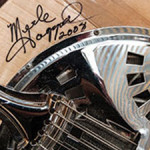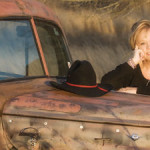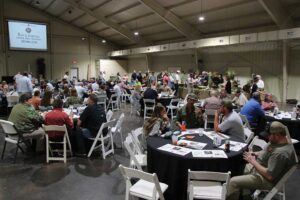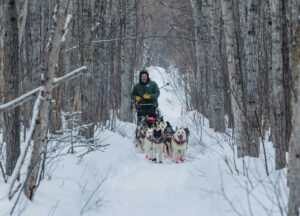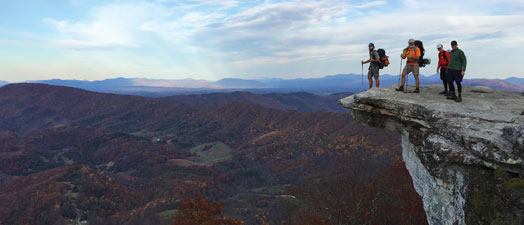
Father, son hike Appalachian Trail for ‘Julie’
Story by Carol Pappas
Photos by Bennett and Henry Fisher
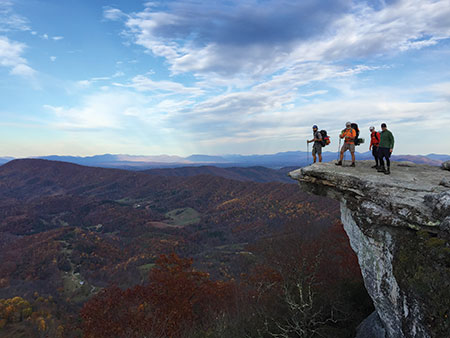 It is said that a journey of a thousand miles begins with a single step. For Pell City’s Henry and Bennett Fisher, the journey of more than 2,000 miles began with a bucket list, a keen sense of adventure and an inspirational 5-year-old. Then, they took that first step.
It is said that a journey of a thousand miles begins with a single step. For Pell City’s Henry and Bennett Fisher, the journey of more than 2,000 miles began with a bucket list, a keen sense of adventure and an inspirational 5-year-old. Then, they took that first step.
Henry, now a retired environmental engineer, began talking about hiking the Appalachian Trail a couple of years ago. His son, Bennett, said he talked about it all the time, and on birthdays and Christmases, the family would give him Appalachian Trail-related gifts – maps, books, whatever they could find.
It was at a trip to the beach that Henry began his usual ‘what ifs’ about the hike, and Bennett said, “I wish my parents were cool,” sparking Bennett to pause and imagine his dad’s adventure and his own as one and the same.
Henry realized it, too, and asked a question that would become a pivotal moment in both their lives. “Do you want to hike the trail with me?,” Henry asked. It didn’t take long for the answer, and the deal was done.
They settled on the hike beginning after Bennett graduated high school in May 2015, and he would delay entering college that fall.
With the potential for bucket list and adventure satisfied, enter their inspiration: Julie Grace Carroll, the 5-year-old daughter of friend David and Melanie Carroll. She suffers from Rett syndrome, a genetic mutation that causes muscular regression, and the Fishers had wished they could do something to help the family.
They decided they would hike for Julie, raising money for Rett research. And that, they did – for 2,189 miles over nearly six months from Maine to Georgia and raising $25,000 for the tragic disease.
On the trail
The journey had an auspicious start, beginning on June 30 at Mt. Katahdin, Maine, with a hike into the 100 Mile Wilderness. At 56 miles, Henry became badly dehydrated. He had pushed too hard too early. A cousin picked him up in New Hampshire and after a few days to recuperate, he found his will and his way again, averaging 14 to 15 miles a day with several days of more than 20 miles.
“Once you get used to it, you can really go,” Henry said. “By the end, I weighed less with my backpack on than I did without it when I started.”
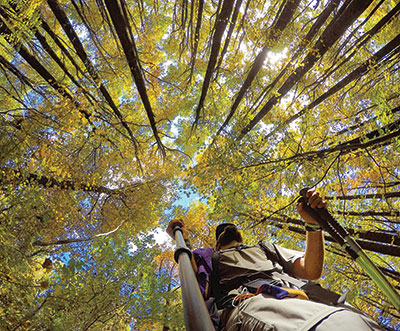 He lost 43 pounds and grew a beard that many likened to ‘Santa Claus.’ They made friendships on the trail that will last a lifetime, and memories they will never forget.
He lost 43 pounds and grew a beard that many likened to ‘Santa Claus.’ They made friendships on the trail that will last a lifetime, and memories they will never forget.
As Henry and Bennett recount the steps of their journey, it is as if they share an inside joke where only the two of them know the punch line. They smile, they chuckle, they even finish each other’s sentences.
The bonding is evident; the recollections vivid.
They rattle off a list of animals they saw – grey fox, squirrels, weasel, chipmunks, eagles, a tiny snapping turtle and “a lot of snakes.” They saw “tons of deer,” heard lots of coyotes but didn’t see any, and they were intrigued by loons, orange salamanders and woodchucks. Mice were a large part of the trail hike, but it seems a fact they would just as soon forget. They even saw 14 black bears, one of which walked up behind Henry – within 15 feet – while he was taking a break in Shenandoah National Park.
What they remember most is that the scenery was magnificent, whether it was atop a mountain peak, fording a stream, watching the sunset across a valley or the moon and stars rising above their campsites.
Bennett talked of the day before they finished the hike. They were camping with friends they made along the trail – Rockfish and Solar Body, who had been with them the last 400 miles. Wondering about the unusual names? Everybody on the trail has a nickname. For Henry, it was Powerslide, stemming from Henry’s occasional inability to keep his footing on slick spots, and for Bennett, it was Jolly, because he was always smiling.
When they finally got the fire started that night, they began reminiscing about their 2,000 miles of rugged adventure. “We were eating dinner and looked up, and there was a meteor shower. It was something special.” Just like the hike.
“We were there, sitting in silence, and I thought, ‘Wow, we’re finally here.’ ”
It wasn’t always easy, of course, but there usually seemed to be something special that followed, making the hardships worthwhile. Soaking, rainy days took their toll. “You never get dry,” said Henry. But as they scaled Clingman’s Dome in Tennessee, having not seen the sun in days, a spectacular sunset descended. “It was so cold and windy up there, my pants froze,” added Bennett, but no one seemed to care. “It was the most beautiful, spectacular sunset I had ever seen,” Henry concluded.
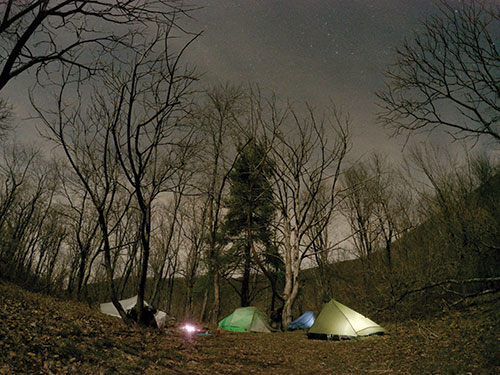 Then there was the climb up Big Bald, north of Hot Springs, N.C., covered in ice and snow. “It was absolutely stunning,” Henry said. “As we went up, it was better and better.”
Then there was the climb up Big Bald, north of Hot Springs, N.C., covered in ice and snow. “It was absolutely stunning,” Henry said. “As we went up, it was better and better.”
Henry’s wife, Vicki, met them when they reached Hot Springs for Thanksgiving Day.
“Eight hikers came and had Thanksgiving lunch with us,” he said.
Neither could conceal their amusement at what they termed, “Time Share Tuesday” or “Doughnut Gap Day,” signifying moments of celebrating simple things others might take for granted. Time Share Tuesday was a rare night in a condominium with a fireplace in Gatlinburg, Tennessee that David Carroll had secured for them.
They had gone 12 days without a shower. They invited fellow hikers from the shelter to come along, and a dozen eagerly accepted the offer. They all piled into two, one-bedroom condominiums with them. “There were two rows of shoes lined up in front of the fireplace to dry out,” Bennett said. “Time Share Tuesday was just great!”
“It gave me a whole new appreciation for plumbing, clean beds and fresh water,” Henry added. “I’m not a hotel snob anymore.”
Doughnut Gap Day was a treat from in-laws who had met them along the way in a gap, bringing doughnuts and chocolate milk. When hiking in those conditions, you need as many calories as you can get, Henry noted. For six months, they “grazed” on Little Debbies, peanut butter crackers, an estimated 400 Snicker Bars, Almond Joys and Tasty Cakes. Pop Tarts and Honey Buns were in the mix as were meal time staples like tuna or salmon, Ramen noodles, pasta and mashed potatoes.
It’s easy to see why Doughnut Gap Day is etched in their memory. Hiking hunger led to doughnuts devoured, and they were on the trail again.
Oh, and they couldn’t forget “Lovely Day.” That was the day they spotted a bear and an eagle, and a hiker’s music could be heard, playing the song, Lovely Day. They all walked down the trail singing along with the lyrics – and the sentiment.
“Trail Magic” was anything someone leaves behind on the trail for you. One day, it was a bag of Oreos, but mice and ants had partaken. “We said, that’s a shame,” according to Henry. “But it didn’t stop Bennett or the other guys.”
It’s the code of the trail, Bennett explained. “You can’t turn down food.” To underscore the notion, he added that he had accidentally dropped some Cheezits on the ground along the way one day, and the hiker coming up behind told him, “ ‘Thanks for leaving them for me, man.’ ”
Meanwhile, back in Pell City
Back home, friends, family and anyone who heard about the hike were rooting for Henry and Bennett. They kept track on Facebook and the radio.
“We are grateful for all the support,” Henry said, noting that Adam Stocks and John Simpson of River 94.1 radio in Pell City would air live reports when Henry and Bennett could call in. They were dubbed, “Tales from the Trail,” and the intro music was appropriately, These Boots Were Made for Walking.
Businesses were supportive, with their windows proclaiming, “Hike for Julie.” Care packages of food came in. Some sent money to buy a cheeseburger. Facebook was full of thoughts, prayers and words of support for the cause. “It meant a tremendous amount to us. We couldn’t have done it without the support of everyone,” Henry said.
Their own encouragement to others who imagine themselves hiking the Appalachian Trail are these sage bits of advice:
- “Find your motivation. You’re going to want to quit. For us, it was Julie, knowing she can’t do it. It was knowing that the family can’t quit. Julie can’t quit. Her parents can’t quit.”
- “Never quit in town. You are going to be warm and dry in a hotel room or hostel, and it is going to be very tempting to go home instead of back to the trail.”
- “Never quit on a rainy day. Rain is temporary, and there will be many more bright, sunny days.”
- “You can’t really prepare so be prepared to not be prepared. Don’t set unrealistic goals.”
- “Have people meet you (along the way) rather than hiking faster to meet people at a certain point. It puts more pressure on your body to make those miles. It’s easier for them to drive to a spot where they will be waiting.”
- “Listen to your body. Take care of yourself.”
But perhaps the best advice came from a New York marathon runner Bennett met on Instagram who picked them up one day and treated them to a cheeseburger. She raises money for causes through her runs, and Henry described her as “the most positive person I have ever met in my life.”
Her message was simple: “Never Give Up.”
And they certainly took heed. The pensive smile father and son share tell it all.
“The longer I’m away from it,” Henry said, “I think I could do it again.”











